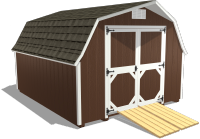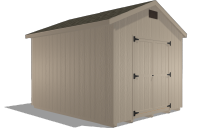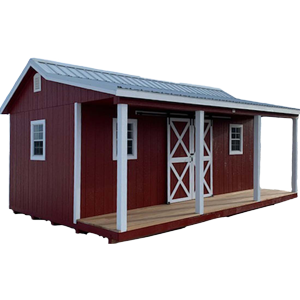Backyard Chickens 101: Beginner's Guide to Raising Your Flock
by Dakota Storage Buildings, on March 16, 2023
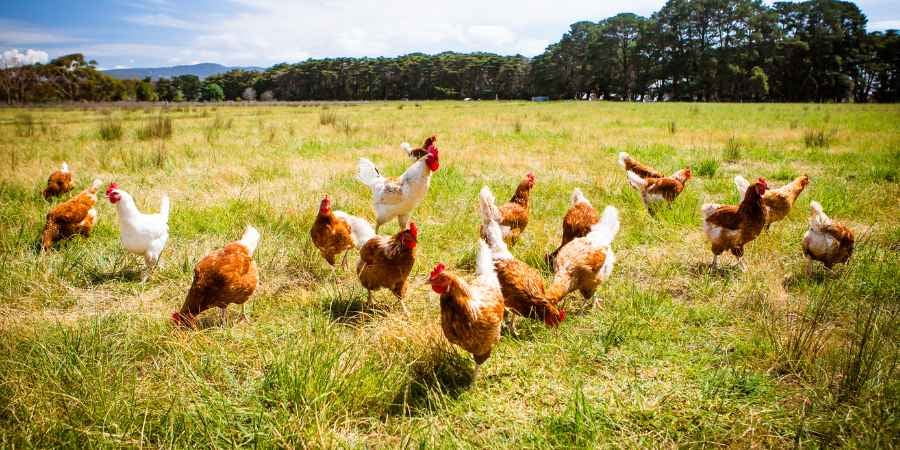
Raising backyard chickens is a fun and exciting adventure! If you want to raise chickens for eggs, you will not be disappointed in the taste compared to store-bought eggs. Chickens can also benefit gardeners as they watch for and target unwanted pests. A flock is a relatively low maintenance, but raising backyard chickens is still a huge commitment. Birds can last for years and need proper care and nutrients. If you are confident about raising chickens but unsure where to start, you have come to the right place! This Backyard Chickens 101 guide details everything a beginner needs to know about raising a flock. Let’s get started!
Getting Started
First things first, before you get started, it is important to look into your town’s laws and ordinances. Some local governments do not allow chickens to be raised in a backyard, while others restrict how many chickens you can have in a flock. Knowing whether or not yo,u can keep chickens on your property is essential. Neglecting to do so can result in a fine and wasted time and money.
Have you considered what breed of chicken you want to raise? There are many different breeds to choose from, and each has its own needs, climate requirements, and attitudes. Before you get your heart set on a specific breed, consider the local climate in which you live. If you are located further south, you will have warmer temperatures. Some birds do not do well in extreme heat, so you may want to consider a Mediterranean breed. If you live in a neutral climate, you will have more options. If you desire, you can choose more than one breed. Different breeds get along with chickens, and you will receive the multi-colored egg basket.
If you can raise chickens on your property, locate an area in your backyard for the coop and run. The area should be large enough to hold a coop with enough space for your chickens. Natural lighting is also important because it triggers the egg-laying process. If your coop is tucked away in a dark, shady area, it can hinder egg production.
Coop Selection and Options
When you begin to look around for the perfect coop, there are multiple factors that you will need to keep in mind. The amount of space each bird requires will vary depending on the breed you choose to raise. A general rule of thumb is to have 3-4 square feet for every bird inside the coop. It is recommended that flocks consist of at least six birds. Chickens are social creatures, and a minimum of six provides a community for the birds. If you plan on having an enclosed run, you must include 8-10 square feet of space per bird. This will give them ample space to run and stretch their wings. For egg production, you will need one nesting box for every four hens so they can have a designated space to lay their eggs. Roosts need not be long because your flock will bundle together for body heat while they sleep. Roosts are essential for keeping your chickens off the dirty floor.
The materials that your coop is made of should be high-quality and withstand harsh weather conditions. Durable, waterproof flooring is essential for resisting decay. Meanwhile, certain roofing materials can block radiant heat to help maintain the interior temperature. Ventilation is also a key feature when choosing a coop. When there is proper airflow, it promotes good health and reduces the chance of your flock catching airborne diseases.
The type of coop you choose should be specific to your needs and budget, but every coop should always prioritize safety. Some coops are stationary, while others are mobile. If you are on the go a lot or want your flock to have a change in scenery, a mobile coop could be a great option for you. Another important decision is whether you will buy a pre-built coop or DIY one yourself. Both options have pros and cons, but with a pre-built coop, you can find a reputable manufacturer that only uses the highest-quality materials. This will help ensure that your investment will last for years.
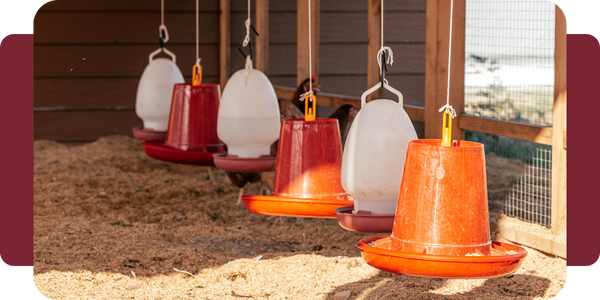
Feeding and Watering
Adult chickens tend to eat around 1.75 pounds of feed each week. That ends up being around half a cup each day. If your birds are not fed enough, it will directly impact their egg-laying. Chickens only eat what they need. By leaving food out for them all day, you will ensure the birds retain enough nutrients to lay eggs but will not end up wasting food and over-feeding your flock. If you want to stick to a feeding routine, you can plan on feeding your flock three times a day. Think about it this way, whenever you eat, it is probably time for your birds to eat. Typically, your chickens will drink three times more than what they eat. When it is hot outside, it is important to have fresh, cold water available. However, you may need to invest in a heated waterer in cold months to prevent the water from freezing.
Health and Hygiene
Like any other pet, chickens can have health problems. If you notice reduced egg production, you need to examine your flock closely. There are numerous reasons why chickens may not be producing as many eggs. Vitamin deficiencies, stress, and infection are three of the most likely reasons why production may be low. Some egg-laying issues can be resolved at home with an enhanced diet and cleaned surroundings. However, some deficiencies require examination by a local veterinarian. You can determine what is best for each bird by monitoring your chickens.
Bacterial, fungal, and viral diseases can also be prevalent among a flock. While these are harder to diagnose and require an examination by a veterinarian, there are some common warning signs you can look out for. Respiratory or breathing problems, a thick and white layer around their comb, sores on the skin, declining egg production, and nasal or eye discharge are some common red flags to look out for. If a bird begins to show any of these symptoms, get them to a veterinarian for further examination.
Keeping the rest of the flock healthy is important when a bird has been infected. A cleaning routine will help prevent diseases and keep them from spreading if a bird does become ill. Wiping down the coop walls and keeping their litter fresh is essential for a healthy flock. On top of that, every time you feed the birds, ensure the feeder and waterer are clean and safe for the birds to use.
Egg Laying
Hens will begin laying eggs around 18 - 22 weeks old. You will know that your hen has reached adulthood and will begin laying eggs soon when she has grown adult feathering. The first eggs may be less frequent. However, as she gets accustomed to the new stage in life, she will get into an egg production routine where she lays four to five eggs a week. Seasons and daylight can have a dietary effect on egg production. You may need to supply artificial light during the winter to keep your hens lying. When daylight decreases, you will find that your hens may stop laying eggs completely.
It is ideal to collect eggs early in the morning, soon after they are laid. If there are any cracks in the shell, it can cause bacteria and should be thrown away. You will need to wait for the hens to leave the nesting box before you try to collect the egg. A great habit is to collect eggs right after you feed the flock. The birds will be preoccupied with food and not care that you are digging around in their coop. You can wipe the eggs with a cloth to remove any dirt. You can store your eggs in the fridge, where they will be kept fresh for a month.
If your hen stops laying eggs due to her age, consider letting her contribute to life in the backyard in other ways. We mentioned earlier that chickens could be a great asset to gardeners. If you have a backyard garden and older hens no longer lay eggs, consider letting them roam the backyard. They will produce natural, nitrogen-rich manure that you can use as fertilizer, help control unwanted weeds, and can catch small bugs and critters that may harm your plants.
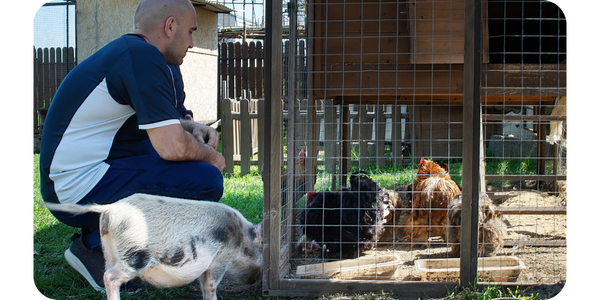
Chick Care
If you are hatching eggs or purchasing young chicks, you must ensure they receive special care. Hatching eggs requires a home incubator that will safely store the eggs. It will take around 21 days for the eggs to hatch and must be closely monitored. Once the chick is out of the shell, it must be removed from the incubator.
Purchasing baby chicks is another option. While they grow, they must be kept under a red brooder lamp that keeps the temperature at 92 degrees Fahrenheit. You must ensure the chicks have starter feed and fresh water to grow and develop properly. Once they have feathers, you can reduce the temperature by 5 degrees weekly. The chicks can transition from starter feed to grower mash at six weeks.
Knowing when to move your chicks into the coop can be difficult. Weather temperatures can play a big role in the timing. If it is winter, you must keep the chicks in the warm brooder for longer periods. However, during the summer months, you may be able to transition to the coop earlier. Around six weeks, chicks have grown real feathers that help them regulate their body temperatures. If you have an older flock, it may be wise to wait until the chick is the same size as the other birds before moving them into the coop. This will help keep the peace and reduce the risk of aggressive behavior.
Common Poultry Problems
Predators can be a real concern for backyard chicken raisers. Nothing is more upsetting than feeding your chicks and realizing that a predator had entered the coop the night before. By taking proactive steps and knowing what you can do to prevent predators from entering the coop is crucial. Multiple common animals pose a threat to chickens. From coyotes and dogs to birds and raccoons, they all pose a threat and leave traces behind after they visit. Securing your coop and adding extra protective layers around the perimeter will reduce the chances of an unwanted visitor. You can also consider leaving meals out for these animals away from the coop.
Birds can become aggressive if stressed, the coop is too small, or the specific breed is prone to fighting. When birds become aggressive, you will notice visible marks and cuts on the flock. Simply expanding the coop could solve this problem. If the problem persists, isolate the problem chicken away from the rest of the birds and slowly transition her back into the flock.
If an egg gets broken, a curious chicken may eat it. Once this happens, they may start to break their eggs so they can eat them purposefully. Chickens are adventurous eaters; if it is edible, a chicken will likely try it. If an egg breaks, throw it out immediately and clean anything with residue. Prevention is key; once a chicken learns she can eat the eggs, it is hard to break the habit.
Prepare to Raise Your Flock
While there is a lot to consider when raising backyard chickens, once you get settled into a routine, we do not think you will regret it! Chickens can be fun pets that provide multiple benefits. Why wait to start if you or your family want to raise a backyard flock? There is no time like the present! Starting your flock will provide you with countless eggs and abundant entertainment. Choosing the right type of coop for your needs and knowing how to care for your flocks properly is essential. If this will be your first time raising a flock, we have a great resource that covers everything you need to know. It covers everything you need to know in raising backyard chickens 101. To learn more, download The Beginner's Guide to Raising Backyard Chickens today!





